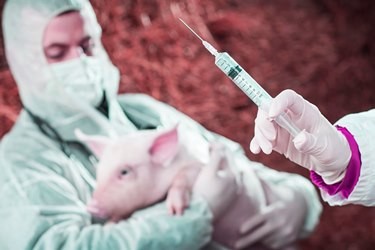The question on whether cloning animals is moral or not is again revived as news spread that China's Boya Biotech will join hands with Sooam Biotech of the Republic of Korea to build the largest cloning facility in Tianjin.
The goal of the two companies is to "produce" a million cloned oxen every year, including dogs and even some endangered species. The Boya Biotech board chairman was quoted as saying that the company is "improving" the primate-cloning technology, but it will not clone humans in deference to public sentiment.
To further enlighten people on the issue, China Daily published the opinions of two science writers on the subject.
Zhang Tiankan is deputy editor-in-chief of Encyclopedic Knowledge and a former research scholar at the Chinese Academy of Medical Sciences, and expressed ethical concerns about cloning animals.
Zhang said that the genes of cloned animals are taken from only one parent animal, which make it vulnerable, unlike natural reproduction, in which the newborn has the genes of both parents and thus can be different from both.
Sixteen years after Dolly the sheep, the first cloned animal, was born in Scotland in 1996, the Nobel Prize for Medicine was awarded to John B. Gurdon and Shinya Yamanaka for proving that it is possible to reprogram specialized cells to become any kind of tissue for the body.
Zhang said cloning can help produce more animal products to meet market demands, but more for food and fur. He added that cloned animals can produce trans-genetic products, such as certain kinds of protein that can be used as medicine. It can also save some endangered species from extinction.
Korea cloned the first pet in 2008, but attempts to commercialize animal cloning in China have failed, Zhang said, because cloned animals tend to die rather young. In addition, the safety of food products made from cloned animals is not verified.
Zhang said the cloning of pets drew criticism, especially on animal welfare grounds. He explained that one cloned pet dog will use about 80 other dogs because only one in scores of cloned embryos is likely to survive. The female dogs carrying the "failed" embryos will abort, which could prove fatal for some of them. Hence, cloning is not only expensive but also raises ethical concerns, Zhang said.
The U.K. Royal Society for the Prevention of Cruelty to Animals has long declared that cloning pet animals is cruelty. In September, the European Parliament passed a bill banning the cloning of cattle or selling of cloned cattle meat, because cloned animals are more vulnerable to health problems.
Zhang wondered if the cloning facility in Tianjin will face the same problem.
On the other hand, Tang Cheng, a Ph.D. candidate at Shanghai Institutes for Biological Sciences, said that the key to the commercial success of cloning animals lies in the safety of cloned animal products.
Tang said that the establishment of a cloning facility may be good news for cattle husbandry. He said cloning would help China raise good foreign cattle breed. He added that it can also benefit the food industry, saying that if trans-genetic food would play a major role in the development of the food industry, cloning will be its core technology.
Tang cited that the U.S. Food and Drug Administration recently allowed the entry of trans-genetic salmon into the market.
Biomedicine can also benefit from cloning, Tang stressed, as cloning can help supply the need for organs of patients who die while awaiting transplants. He said cloning can help solve the problem by cloning human organs.
Tang said it will still take years to master the technology of cloning primates. He added that trans-genetic food will also have a hard time to attain commercial success unless its safety is guaranteed by the government.



























